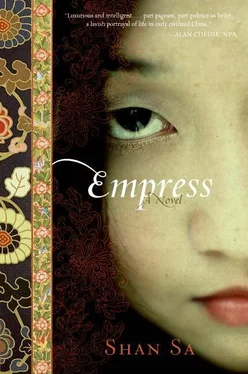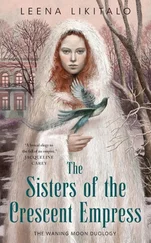Shan Sa - Empress
Здесь есть возможность читать онлайн «Shan Sa - Empress» весь текст электронной книги совершенно бесплатно (целиком полную версию без сокращений). В некоторых случаях можно слушать аудио, скачать через торрент в формате fb2 и присутствует краткое содержание. Жанр: Историческая проза, на английском языке. Описание произведения, (предисловие) а так же отзывы посетителей доступны на портале библиотеки ЛибКат.
- Название:Empress
- Автор:
- Жанр:
- Год:неизвестен
- ISBN:нет данных
- Рейтинг книги:5 / 5. Голосов: 1
-
Избранное:Добавить в избранное
- Отзывы:
-
Ваша оценка:
- 100
- 1
- 2
- 3
- 4
- 5
Empress: краткое содержание, описание и аннотация
Предлагаем к чтению аннотацию, описание, краткое содержание или предисловие (зависит от того, что написал сам автор книги «Empress»). Если вы не нашли необходимую информацию о книге — напишите в комментариях, мы постараемся отыскать её.
Empress — читать онлайн бесплатно полную книгу (весь текст) целиком
Ниже представлен текст книги, разбитый по страницам. Система сохранения места последней прочитанной страницы, позволяет с удобством читать онлайн бесплатно книгу «Empress», без необходимости каждый раз заново искать на чём Вы остановились. Поставьте закладку, и сможете в любой момент перейти на страницу, на которой закончили чтение.
Интервал:
Закладка:
As soon as we arrived, the Great Nun lectured the novices: “Children, my women are answerable to a father and his changing fortunes. As adults, they attach themselves to a fickle husband. Sometimes abandoned, sometimes adulated, wracked with jealousy and sick with suspicion, women die of sorrow; they slip away in childbirth and are struck down by illness. Man is woman’s enemy! Fathers barter and haggle to marry us off. Husbands lie and exploit us. Children betray us and kill us! Noblewomen, townswomen, peasant women-all of them are like beasts of burden pulling the cart of a pointless existence. Never think that living out that sort of existence will set you free for your future life. Without prayer, without Buddha’s help, the lives to come will be an eternal repetition. I am often asked how a woman can obtain her freedom. I reply that a woman’s freedom begins when she understands the word ”independence‘-refusing the softness of silk, the delights of fine food, the bands of passion and the enslavement of motherhood- renouncing pleasures, longings, and illusions! Forget your breasts that nourish only sorrow, forget your bellies that conceive only crime, reject the soft caresses that are the source of all pain. Breaking with the home, with men, and with pleasure is the first step toward deliverance!“
I learned later that this Great Nun had been a favorite of Emperor Yang of the overthrown dynasty, and the nuns in the monastery had all served emperors. To erase all memories of Court and to repent of its sins of vanity, the community applied the strictest laws. The imperial annuities that arrived every month meant we could survive in misery. We were forbidden visits by relations or to write letters. We were forbidden to speak to one another or to meet-except during prayer times. There was a constant succession of lectures and confessionals. The senior bonzes, elderly withered creatures themselves, toiled to extract the youth from our bodies as if it were gangrene.
The wind howled a mournful funeral song. High walls as white as shrouds surrounded the temples with their curved roofs. There were scrubby clumps of grass along the path where we let the sheep and goats graze. There were no mirrors, no sheets of gold. There was no face powder, no perfume, no laughter. There were no birds in cages, no red carp in bowls, no soft silken carpets, golden floor tiles, marble basins, or pillars of fragrant wood. There was no red, or pink, violet, or yellow. Wan was the color of nuns, black the soot from the tapers, gray the cotton dresses, blue the sky, and green the forest that hemmed us in.
My bed was a plank of wood. No more meat or wine, no more drunken happiness, no more poetry improvised by moonlight, no more musical instruments being played, no more picnics beside the river, no more cranes flying upward, black silhouettes against the velvet skies. Every night without these pleasures chafed me. Their gloomy silence incited me to tortuous meditation.
The first winter was harsh. I was cold. Ruby and Emerald, who had followed me and become nuns, had chapped hands from washing my clothes in freezing water. I stole the lamp oil to rub into their wounds. Morning prayer was held when it was still dark. We recited the sutra, a muted droning, despite the bouts of coughing. In the palace, we had been served five meals a day; in the monastery, the nuns were allowed to take meals only in the morning and at midday. I was possessed by my hunger all afternoon. I missed the horses and, without books, I could no longer escape.
I was called Perfect Clarity. My face as it had been in my previous life faded in my memory. Without mirrors, the other nuns became my reflection: bushy eyebrows, dry skin, walking skeletons.
During the second winter, an epidemic swept through the monastery, and I came down with a violent fever. For days on end, I saw the monastery as a funereal city peopled with ghosts. I called for Little Phoenix. I begged him to take me away from the kingdom of the dead. Hugging a beautiful concubine in his arms, he would say: “Heavenlight, you left me. You wanted to be exiled. You cannot blame me if I forget you.”
When I came back to my senses, the bells were ringing and funeral orations filled my ears. Since the monastery forbade the use of medicines and healed the sick with prayer, the scourge had taken the lives of some twenty bonzes. Would I be the next to be inscribed on the list of the dead? Down to the depths of my entrails, I could feel Mother’s pain now that she no longer had news of me. If I were to die, would this pious woman who had known every misfortune be able to confront her suffering simply by fingering her rosary beads?
Buddha blessed me with a miracle. I survived that winter by drinking tea. When I finally recovered, it was already springtime. The sun that dazzled me then was no longer the sun of yesterday, and I was no longer the same person. Something in me had been burned out. I no longer felt any desire. I was no longer hungry, and I no longer hoped for anything. The sutras seemed intelligible to me now. I started studying Sanskrit and prepared to undertake a great imaginary pilgrimage to discover the origins of Buddhism.
A huge ceremony of offerings was addressed to the late emperor’s spirit, bringing an end to the period of mourning. Ruby and Emerald started waiting by the gates, looking out for messengers from the Palace. Days passed, months drifted by, their impatience wore thin, their hopes dwindled. Little Phoenix, Master of the World, had forgotten me. I was no longer sad, but Ruby and Emerald wept in secret, and my only regret was that I had led them into this tomb in which they were buried alive.
I had just turned twenty-eight, the age when a woman should break with her illusions of a better life.
FIVE
Ruby ran to me so quickly that she tripped. She leapt back to her feet and cried: “The messenger from Court has just left! The Emperor wishes to come to the monastery to burn incense, make offerings to the late sovereign’s spirit, and distribute gifts to the former imperial concubines. Mistress, he has not forgotten you!”
The community was gripped with fevered activity. Rumor and whispering echoed behind every wall. The nuns, who had once been so gifted in the art of intrigue, had guessed that the Son of Heaven was coming to see a woman. Irritated and honored in equal measures, the Council of Great Nuns had no choice but to restore the temples and dormitories and to erect a pavilion intended as his August Resting Place. Fences sprang up around the building sites to shield us from the workmen’s eyes, but the symphony of hammering put an end to silence and meditation. I felt responsible, guilty, for this all-consuming confusion, but I was more disturbed at the thought of seeing a face that had so faded in my memory.
A delegation of eunuchs came to inspect the premises and to establish the laws of protocol. Then, at dawn on the twentieth day of the first moon, the imperial regiments circled the forest, and we knelt before the gates of the monastery. A long time passed before we saw golden panels with ornate calligraphy appearing on the horizon. The wind dropped, and the birds fell silent. Eunuchs and imperial guards marched past us in a two by two procession that went on for many hours, then the Emperor eventually stepped over the Threshold of Purity.
After three years of separation, Little Phoenix was unrecognizable. He wore a beard that gave him an air of authority, and he walked with quiet purpose. While he received the prostration of the nuns, he sat like a statue on his tall seat, a sacred icon, an inaccessible god. After the celebration, the gifts were distributed: One after the other the nuns approached the sovereign, and he gave each of them a tunic and a sandalwood rosary. Their gray dresses, shaven heads, and unpowdered faces filed past in ceremonial silence. Little Phoenix did not recognize me. Heavenlight had died inside Perfect Clarity’s body!
Читать дальшеИнтервал:
Закладка:
Похожие книги на «Empress»
Представляем Вашему вниманию похожие книги на «Empress» списком для выбора. Мы отобрали схожую по названию и смыслу литературу в надежде предоставить читателям больше вариантов отыскать новые, интересные, ещё непрочитанные произведения.
Обсуждение, отзывы о книге «Empress» и просто собственные мнения читателей. Оставьте ваши комментарии, напишите, что Вы думаете о произведении, его смысле или главных героях. Укажите что конкретно понравилось, а что нет, и почему Вы так считаете.





